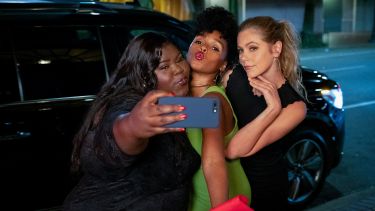Is the past more replicable than imagined?
Undercovering the horror of the black condition: Why you might not find Antebellum scary.

Antebellum is a 2020 mystery suspense thriller following the seemingly interconnected lives of two women Eden and Veronica Henley; both played by renowned actress Janelle Monae.
Directors Gerard Bush and Christopher Renz showcase a warped reality in which the past and present are shown to have more in connection than once believed. Once the movie’s twist is revealed, Antebellum is a film saturated in symbolism and commentary on the current state of America, it’s a movie with a lot to say. But who is it saying it to?
Early reviews on the movie have been overwhelmingly negative, with a Rotten Tomatoes critics score of 29% and The Guardian writing that the movie ‘offers neither a coherent social commentary nor…a revenge thriller’s catharsis.’ Writer Ellen E Jones questions ‘what else, besides entertainment, could its purpose be?’ Well, if I could take the opportunity Ms Jones, I might be able to answer that for you.
For the purpose of this review, I will be obligated to spoil this movie, but please be aware that this does not take away from the brilliance of the movie or its direction. Antebellum tells the story of Eden, an enslaved woman living in Antebellum, while in another reality, successful author and sociologist Veronica Henley embarks on the next stage of her thriving career.
However, the movie is not what it seems. At the movie's epiphany, it is revealed that Eden and Veronica are the same woman, and the Antebellum plantation is a re-enactment site created by white supremacists hoping to recreate the power dynamics of slavery. With the true nature of the film revealed, the real horror of the protagonist’s situation unravels itself, the past is not as contained to history books as we once thought.
Antebellum’s true horror breeds itself from the dormant but ever-present fear that all black people have within themselves; are we ever truly safe from the repetition of the past?
Our movie’s protagonist Veronica Henley is the symbol of black excellence, she is successful, educated, a career woman with a loving husband and an adoring daughter. She is the woman who has it all, but despite her status and success in the world, her power is immediately rescinded by the will of white supremacy.
Veronica finds herself kidnapped and transported to a plantation in which she and other unexpecting African Americans are forced to take part in sadistic confederate roleplaying. Veronica finds herself sexually assaulted, branded, starved, and overworked as well as witness to the deaths of multiple other black individuals.
The movie provides no comfort or consideration to the sensibilities of the audience, everything is raw, uncomfortable, and jarring to witness. This to me sounds like the perfect recipe for a horror movie, but why is it that so many critics do not agree? To me it seems that they are missing the one component that I and many other viewers have: melanin. Antebellum is one of those movies which you either get it, or you don’t, and oh boy do I get it.
With the progression of society, the developments in the Black Lives Matter Movement and the recurrent success of women such as Simone Biles, Sha’Carri Richardson and recent history making National Spelling Bee champion Zaila Avant-Garde, it seems as though black excellence is on the rise as well as the recognition of the black people’s abilities.
However, on the other side of this success comes the reality of the danger of black people still face in America as well as all over the world, with the globally witnessed murder of George Floyd and the lynching of Ahmaud Arbery. It is clear that black lives are still under constant threat from white nationalism and race-based violence.
In the minds of many black people, we know that our success does not grant us stability, that our ambition, intelligence, and status does not make us safe from the objection or hatred of racism. Antebellum articulates this understanding and attempts to share this with the white community, however, it seems the message hasn’t been understood. Allow me to use one of the small details in the film to attempt to make the message clearer, the Pat McGrath lipstick in shade Vendetta.
In the movie, Veronica dons the shade by legendary business owner Dame Patricia McGrath, the first make-up mogul to be made a British dame. Veronica’s use of the make-up brand comes across to me as intentional. McGrath is the symbol of successful black success, creating one of the most renown cosmetic brands in the world. It is a brand Veronica proudly wears, on her it becomes a metaphor for her own success and the success of other black people.
It also becomes a symbol of the black condition; the lipstick is later shown to be taken and worn by one of her capturers Elizabeth (Jena Malone). With the scene a few things about the black experience is revealed, one: our success and status, while empowering cannot protect us, and two: those who oppose our existence will always replicate what we do or wear while synonymously refuse to grant respect or recognition to us. The movie dares to ask are black people ever truly safe?
So, Ms Jones and the countless reviews which don’t seem to get Antebellum or believe it missed the mark, I hope you understand it now or take steps to understand that the movie isn’t your typical horror movie. It does not rely on the traditional jump care, satanic ritual or demonic possession, but rather the fear of the movie is the reality of being black in America, or even anywhere.
Written by Valentia Adarkwa-Afari, School of English on 3 August 2021.
